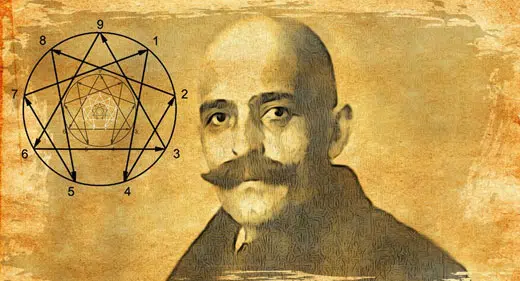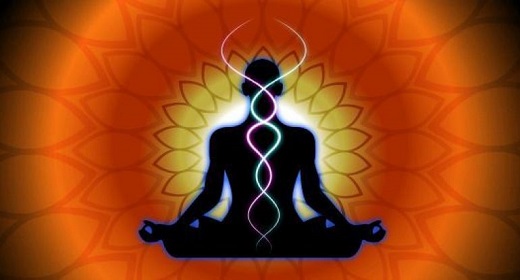
AWAKEN: A very good day to you, Mr. Gurdjieff… we at Awaken are so grateful to spend this time with you. When I mentioned this upcoming interview to a friend who I knew has been an ardent reader of yours for many years, she mentioned Meetings with Remarkable Men. This book has been most well received by so many! To begin… what exactly is a “remarkable man?”
GEORGE GURDJIEFF: I consider it necessary to explain exactly the expression “a remarkable man,” since like all expressions for definite notions it is always understood among contemporary people in a relative, that is a purely subjective, sense. For example, a man who does tricks is for many people a remarkable man, but even for them he ceases to be remarkable as soon as they learn the secret of his tricks. As a definition of who may be considered and called remarkable, I will simply say, for the present, to cut a long story short, to what men I personally apply this expression.
From my point of view, he can be called a remarkable man who stands out from those around him by the resourcefulness of his mind, and who knows how to be restrained in the manifestations which proceed from his nature, at the same time conducting himself justly and tolerantly towards the weaknesses of others. Since the first such man I knew—whose influence left its trace on the whole of my life—was my father.
AWAKEN: Could you share with us a memory of your father that made a lasting impact on you?
GURDJIEFF: On the evenings before Sundays and holidays, when we did not have to get up early the following morning, my father would tell stories to us children, either about ancient great peoples and wonderful men, or about God, nature and mysterious miracles, and he would invariably conclude with some tale from The Thousand and One Nights, of which he knew so many that he could indeed have told us one whole tale for each of the thousand and one nights.
Among the many strong impressions from these various stories of my father’s, which left their mark on my whole life, there was one that served for me in later years, perhaps no less than five times, as a “spiritualizing factor”enabling me to comprehend the incomprehensible. This strong impression, which later served for me as a spiritualizing factor, became crystallized in me while, one evening, my father was reciting and singing the legend of the Flood before the Flood and there arose between him and a certain friend of his a discussion on this subject.
AWAKEN: Are there any other anecdotes about your father that you’d like to share?
GURDJIEFF: One evening when I was in the workshop, my future tutor entered unexpectedly and, as he walked in, asked my father: “Where is God just now?” My father answered most seriously, “God is just now in Sari Kamish.”Sari Kamish is a forest region on the former frontier between Russia and Turkey, where unusually tall pine-trees grow. Receiving this reply from my father, the dean asked, “What is God doing there?”
My father answered that God was making double ladders there and on the tops of them he was fastening happiness, so that individual people and whole nations might ascend and descend. These questions and answers were carried on in a serious and quiet tone—as though one of them were asking the price of potatoes today and the other replying that the potato crop was very poor this year. Only later did I understand what rich thoughts were concealed beneath such questions and answers. They very often carried on conversations in this same spirit, so that to a stranger it would have seemed that here were two old men out of their senses, who were at large only by mistake instead of being in a mad-house.
AWAKEN: I can see that your father had a tremendous influence on your spiritual life…
GURDJIEFF: Many of these conversations, which then seemed to me meaningless, grew to have a deep meaning for me later when I came across questions of the same kind.
AWAKEN: What lasting lesson or teaching from your father, do you still embrace… something we can all take with us, so to speak? For example, did he speak about things like the meaning or purpose of life?
GURDJIEFF: My father had a very simple, clear and quite definite view on the aim of human life. He told me many times in my youth that the fundamental striving of every man should be to create for himself an inner freedom towards life and to prepare for himself a happy old age. He considered that the indispensability and imperative necessity of this aim in life was so obvious that it ought to be understandable to everyone without any wiseacring.
AWAKEN: How lovely… So often in today’s world, we don’t really think about this… about setting ourselves up for a peaceful and truly enjoyable life in our older years. We work and work and work, with some vague idea of enjoying it once we retire, but by then we’re too beaten and decrepit to enjoy anything, at all! In practical terms, how can we better put this aim into motion?
GURDJIEFF: A man could attain this aim only if, from childhood up to the age of eighteen, he had acquired data for the unwavering fulfillment of the following four commandments:
First— To love one’s parents.
Second—To remain chaste.
Third— To be outwardly courteous to all without distinction, whether they be rich or poor, friends or enemies, power possessors or slaves, and to whatever religion they may belong, but inwardly to remain free and never to put much trust in anyone or anything.
Fourth—To love work for work’s sake and not for its gain.
AWAKEN: I hope it is not too commonplace a question, but I’d love to know what, if anything, he had to say about the soul? What is it? Does it endure after death?
GURDJIEFF: I remember that, the last time I went to see him, I asked him one of the stereotyped questions by means of which I had carried on, during the last thirty years, a special inquiry or quest in my meetings with remarkable people… Namely, I asked him, of course with the preliminary preparation which had become customary to me in these cases, to tell me, very simply and without any wiseacring and philosophizing, what personal opinion he had formed during his life about whether man has a soul and whether it is immortal. “How shall I put it?” he answered. “In that soul which a man supposedly has, as people believe, and of which they say that it exists independently after death and transmigrates, I do not believe; and yet, in the course of a man’s life “something” does form itself in him: this is for me beyond all doubt.”
AWAKEN: Does this something “carry on?” Or, does it perish upon death of the physical body?
GURDJIEFF: As I explain it to myself, a man is born with a certain property and, thanks to this property, in the course of his life certain of his experiencings elaborate in him a certain substance, and from this substance there is gradually formed in him “something or other” which can acquire a life almost independent of the physical body. When a man dies, this “something” does not disintegrate at the same time as the physical body, but only much later, after its separation from the physical body. Although this “something” is formed from the same substance as the physical body of a man, it has a much finer materiality and, it must be assumed, a much greater sensitivity towards all kinds of perceptions.
AWAKEN: And how do we live awakened lives while here on earth?
GURDJIEFF: It is only by grounding our awareness in the living sensation of our bodies that the I AM, our real presence, can awaken.
AWAKEN: But your approach to awakening our consciousness is more complex than that… I have noted in your lectures and writings much emphasis on the necessity of studying ourselves and our psychology…
GURDJIEFF: Perhaps you realize how difficult it is to define what is meant by psychology? There are so many meanings attached to the same words in different systems that it is difficult to have a general definition. So we begin by defining psychology as study of oneself. You have to learn certain methods and principles and, according to these principles and using these methods, you will try to see yourselves from a new point of view.
If we begin to study ourselves, we first of all come up against one word which we use more than any other and that is the word “I.” We say “I am doing,” “I am sitting,” “I feel,” “I like,” “I dislike” and so on. This is our chief illusion, for the principal mistake we make about ourselves is that we consider ourselves one; we always speak about ourselves as ‘I’ and we suppose that we refer to the same thing all the time when in reality we are divided into hundreds and hundreds of different “I”s. At one moment when I say “I,” one part of me is speaking, and at another moment when I say “I,” it is quite another “I” speaking. We do not know that we have not one “I,” but many different “I”s connected with our feelings and desires, and have no controlling “I.” These “I”s change all the time; one suppresses another, one replaces another, and all this struggle makes up our inner life.
AWAKEN: And this struggle suggests that we really don’t know ourselves, at all, and yet knowing ourselves is the main task!
GURDJIEFF: Our starting point is that man does not know himself, that he is NOT… that is, he is not what he can and what he should be. A man is never the same for long. He is continually changing. For this reason he cannot make any agreements or assume any obligations. He can decide nothing in regard to the future. Today he is one person and tomorrow another.
For instance, take one point. A situation may arise, not, of course, in the beginning but later on, when a man has to preserve secrecy, even if only for a time, about something he has learned. But can a man who does not know himself promise to keep a secret? Of course he can promise to do so, but can he keep his promise? For he is not one, there are many different people in him. One in him promises, and believes that he wants to keep the secret. But tomorrow another in him will tell it to his wife, or to a friend over a bottle of wine, or a clever man may question him in such a way that he himself will not notice that he is letting out everything. Finally, he may be hypnotized, or he may be shouted at unexpectedly and frightened, and he will do anything you like. What sort of obligations can he take upon himself? No, with such a man we will not talk seriously. To be able to keep a secret a man must know himself. And a man such as all men are is very far from this.
AWAKEN: If we scarcely have control over our actions as you describe, what does this say about our free will?
GURDJIEFF: What we call our will in the ordinary sense is only the resultant of desires. As I have said before, man’s chief delusion is his conviction that he can do. All people think that they can do, all people want to do, and the first question all people ask is what they are to do. But actually nobody does anything and nobody can do anything. This is the first thing that must be understood.
Everything happens. All that befalls a man, all that is done by him, all that comes from him—all this happens. And it happens in exactly the same way as rain falls as a result of a change in the temperature in the higher regions of the atmosphere or the surrounding clouds, as snow melts under the rays of the sun, as dust rises with the wind.
Man is a machine. All his deeds, actions, words, thoughts, feelings, convictions, opinions, and habits are the results of external influences, external impressions. Out of himself a man cannot produce a single thought, a single action. Everything he says, does, thinks, feels—all this happens. Man cannot discover anything, invent anything. It all happens.
To establish this fact for oneself, to understand it, to be convinced of its truth, means getting rid of a thousand illusions about man, about his being creative and consciously organizing his own life, and so on. There is nothing of this kind. Everything happens—popular movements, wars, revolutions, changes of government, all this happens. And it happens in exactly the same way as everything happens in the life of individual man. Man is born, lives, dies, builds houses, writes books, not as he wants to, but as it happens. Everything happens. Man does not love, hate, desire—all this happens.
But no one will ever believe you if you tell him he can do nothing. This is the most offensive and the most unpleasant thing you can tell people. It is particularly unpleasant and offensive because it is the truth, and nobody wants to know the truth.
But it is one thing to understand with the mind and another thing to feel it with one’s whole mass, to be really convinced that it is so and never forget it.
With this question of doing… yet another thing is connected. It always seems to people that others invariably do things wrongly, not in the way they should be done. Everybody always thinks he could do it better. They do not understand, and do not want to understand, that what is being done, and particularly what has already been done in one way, cannot be, and could not have been, done in another way. Have you noticed how everyone now is talking about the war? Everyone has his own plan, his own theory. Everyone finds that nothing is being done in the way it ought to be done. Actually everything is being done in the only way it can be done. If one thing could be different everything could be different. And then perhaps there would have been no war.
AWAKEN: Would it be accurate to say that all of the unrest and violence in the world only exist because of humankind’s unconscious behavior? Or do good and bad exist in an inherent and inevitable way? I guess I have opened the door to the philosophical problem of evil!
GURDJIEFF: If a man understands that he is asleep, and if he wishes to awake, then everything that helps him to awake will be “good” and everything that hinders him will be “evil,” exactly in the same way will he understand what is good and evil for other people; what helps them to awake is “good”… What hinders them is “evil.” But this is so only for those who want to awake. That is, for those who understand that they are asleep. Those that do not understand that they are asleep and have no wish to awake cannot have an understanding of good and evil.
And as the overwhelming majority of people do not realize and will never realize that they are asleep, neither good nor evil can actually exist for them. This contradicts generally accepted ideas. People are accustomed to think that good and evil are the same for everyone and above all, that good and evil exist for everyone. In reality, however, good and evil only exist for a few. For those who have an aim and who pursue that aim. Then what hinders the pursuit of that aim is evil and what helps is good.
But of course, most sleeping people will say that they have an aim and that they are going somewhere. The realization that he has no aim, and that he’s not going anywhere is the first sign of the approaching awakening of a man… of awakening becoming really possible for him. Awakening begins when a man realizes that he’s going nowhere and does not know where to go.
AWAKEN: In thinking about the need to clarify our aim in life, I see that there is a dilemma, given the problem of conflicting desires that we were just speaking about. Can we return to this for a moment? Is this why you underline the importance of self knowledge… so as to sort out those inner conflicts?
GURDJIEFF: Knowledge by itself is not sufficient. One can know and desires can still be in conflict, because each desire represents a different will… The resultant sometimes reaches a definite line of action and at other times cannot reach any definite line, because one desire goes one way and another, another way, and we cannot decide what to do. This is our usual state.
Certainly our future aim must be to come to oneness instead of being many, as we are now, because in order to do anything rightly, to know anything rightly, to arrive anywhere, we must become one. It is a very far aim, and we cannot begin to approach it until we know ourselves, because, in the state in which we are now, our ignorance of ourselves is such that when we see it we begin to be terrified that we may not find our way anywhere. The human being is a very complicated machine and has to be studied as a machine. We realize that in order to control any kind of machine, such as a motor car or a railway engine, we should first have to learn. We cannot control these machines instinctively, but for some reason we think that ordinary instinct is sufficient to control the human machine, although it is so much more complicated. This is one of the first wrong assumptions: we do not realize that we have to learn, that control is a question of knowledge and skill.
AWAKEN: So, until then, everything is like the popular saying… “It is what it is?”
GURDJIEFF: Try to understand what I am saying: everything is dependent on everything else, everything is connected, nothing is separate. Therefore everything is going in the only way it can go. If people were different, everything would be different. They are what they are, so everything is as it is.
AWAKEN: You speak often about the importance of truthfulness, which seems to be an obvious necessity within all relationships, so why does this even need to be declared?
GURDJIEFF: You do not realize that one has to learn to speak the truth. It seems to you that it is enough to wish or to decide to do so. And I tell you that people rarely tell a deliberate lie. In most cases, they think they speak the truth. And yet they lie all the time, both when they wish to lie and when they wish to speak the truth. They lie all the time, both to themselves and to others. Therefore nobody ever understands either himself or anyone else.
Think—could there be such discord, such deep misunderstanding, and such hatred towards the views and opinions of others, if people were able to understand one another? But they cannot understand because they cannot help lying. To speak the truth is the most difficult thing in the world; and one must study a great deal and for a long time in order to be able to speak the truth.
The wish alone is not enough. To speak the truth one must know what the truth is and what a lie is, and first of all in oneself. And this nobody wants to know.
AWAKEN: What exactly do you mean by lying?
GURDJIEFF: Lying is thinking or speaking about things that one does not know; this is the beginning of lying. It does not mean intentional lying—telling stories, as for instance that there is a bear in the other room. You can go to the other room and see that there is no bear in it. But if you collect all the theories that people put forward on any given subject, without knowing anything about it, you will see where lying begins. Man does not know himself, he does not know anything, yet he has theories about everything. Most of these theories are lying.
AWAKEN: Interesting… to be truthful, we must know ourselves… How do we begin our quest toward greater self awareness and toward being a more conscious person generally?
GURDJIEFF: This is quite simple to explain, although it is very difficult to achieve. There are no roundabout ways. A better state can only be achieved by direct effort, just by trying to be more conscious, by asking oneself as often as possible, “Am I conscious or not?”
AWAKEN: It’s like remembering ourselves… over and over again, throughout the day…
GURDJIEFF: To remember oneself means the same thing as to be aware of oneself—I AM. Sometimes it comes by itself; it is a very strange feeling. It is not a function, not thinking, not feeling; it is a different state of consciousness. By itself it only comes for very short moments, generally in quite new surroundings, and one says to oneself: ‘How strange. I am here’. This is self-remembering; at this moment you remember yourself.
AWAKEN: Summoning back to the “something” that your father spoke of… Is this “I AM” eternal, like the Hindu atman… which is conceived as an immortal soul?
GURDJIEFF: Immortality is not a property with which man is born. But man can acquire immortality.
AWAKEN: Can you explain further?
GURDJIEFF: All existing and generally known ways to immortality can be divided into three categories:
1. The way of the fakir.
2. The way of the monk.
3. The way of the yogi.
The way of the fakir is the way of struggle with the physical body. This is a long, difficult, and uncertain way. The fakir strives to develop physical will, power over the body. This is attained by means of terrible sufferings, by torturing the body. The whole way of the fakir consists of various incredibly difficult physical exercises. The fakir either stands motionless in the same position for hours, days, months, or years; or sits with outstretched arms on a bare stone in sun, rain, and snow; or tortures himself with fire, puts his legs into an ant-heap, and so on.
But his other functions-emotional, intellectual, and so forth—remain undeveloped… You cannot imagine what hardships fakirs undergo. I do not know whether you have seen real fakirs or not. I have seen many; for instance, I saw one in the inner court of a temple in India and I even slept near him. Day and night for twenty years he had been standing on the tips of his fingers and toes. He was no longer able to straighten himself. His pupils carried him from one place to another, took him to the river and washed him like some inanimate object. But this was not attained all at once. Think what he had to overcome, what tortures he must have suffered in order to get to that stage…
You must understand that I take the word “fakir” in quotation marks. In Persia fakir simply means a beggar; and in India a great many jugglers call themselves fakirs. And Europeans, particularly learned Europeans, very often give the name of fakir to yogis, as well as to monks of various wandering orders. But in reality the way of the fakir, the way of the monk, and the way of the yogi are entirely different. So far I have spoken of fakirs. This is the first way.
AWAKEN: And the second way?
GURDJIEFF: The second way is the way of the monk. This is the way of faith, the way of religious feeling, religious sacrifice. Only a man with very strong religious emotions and a very strong religious imagination can become a monk in the true sense of the word. The way of the monk is very long and hard. A monk spends years and tens of years struggling with himself, that is, on feelings. Subjecting all his other emotions to one emotion, that is, to faith, he develops unity in himself, will over the emotions, and in this way reaches the fourth room. But his physical body and his thinking capacities may remain undeveloped. In order to be able to make use of what he has attained, he must develop his body and his capacity to think. This can only be achieved by means of fresh sacrifices, fresh hardships, fresh renunciations. A monk has to become a yogi and a fakir. Very few get as far as this; even fewer overcome all difficulties. Most of them either die before this or become monks in outward appearance only.
AWAKEN: What is the third way?
GURDJIEFF: The third way is the way of the yogi. This is the way of knowledge, the way of mind. The yogi develops his mind, but his body and emotions remain undeveloped and, like the fakir and the monk, he is unable to make use of the results of his attainment. He knows everything but can do nothing… however he has the advantage of understanding his position, of knowing what he lacks, what he must do, and in what direction he must go. But, as on the way of the fakir or the monk, very few acquire this understanding on the way of the yogi, that is, that level in his work on which a man knows where he is going. A great many stop at one particular achievement and go no further.
AWAKEN: What is the guiding light, so to speak, for these paths?
GURDJIEFF: The love of God, in constant efforts to obey and serve God, although, in his understanding of the idea of God and of serving God, there may be much that is subjective and contradictory.
AWAKEN: And is there anything in common, in terms of practice or method?
GURDJIEFF: All the ways, the way of the fakir as well as the way of the monk and the way of the yogi, have one thing in common. They all begin with the most difficult thing, with a complete change of life, with a renunciation of all worldly things. A man must give up his home, his family if he has one, renounce all the pleasures, attachments, and duties of life, and go out into the desert, or into a monastery or a yogi school. From the very first day, from the very first step on his way, he must die to the world; only thus can he hope to attain anything on one of these ways.
AWAKEN: And these are the methods to immortality?
GURDJIEFF: The ways lead, or should lead, man to immortality. Everyday life, even at its best, leads man to death and can lead to nothing else.
AWAKEN: Everyday life, and even what is accepted as “good education” is so far removed from anything resembling evolution of the spirit…
GURDJIEFF: In the ordinary conditions of cultured life, the position of a man, even of an intelligent man, who is seeking for knowledge is hopeless, because, in the circumstances surrounding him, there is nothing resembling either fakir or yogi schools, while the religions of the West have degenerated to such an extent that for a long time there has been nothing alive in them. And the position would indeed be hopeless if the possibility of yet a fourth way did not exist.
AWAKEN: We have arrived at the fourth way…
GURDJIEFF: The fourth way requires no retirement into the desert, does not require a man to give up and renounce everything by which he formerly lived. The fourth way begins much further on than the way of the yogi. This means that a man must be prepared for the fourth way and this preparation must be acquired in ordinary life and be a very serious one, embracing many different sides. Furthermore, a man must be living in conditions favorable for work on the fourth way, or, in any case, in conditions which do not render it impossible.
It must be understood that both in the inner and in the external life of a man there may be conditions which create insuperable barriers to the fourth way. Furthermore, the fourth way has no definite forms like the ways of the fakir, the monk, and the yogi. And, first of all, it has to be found. This is the first test.
At the same time, the beginning of the fourth way is easier than the beginning of the ways of the fakir, the monk, and the yogi… it is possible to work and to follow this way while remaining in the usual conditions of life, continuing to do the usual work, preserving former relations with people, and without renouncing or giving up anything.
The fourth way differs from the other ways in that the principal demand made upon a man is the demand for understanding. A man must do nothing that he does not understand. The more a man understands what he is doing, the greater will be the results of his efforts. This is a fundamental principle of the fourth way. The results of work are in proportion to the consciousness of the work. No faith is required on the fourth way; on the contrary, faith of any kind is opposed to the fourth way. On the fourth way a man must satisfy himself of the truth of what he is told. And until he is satisfied he must do nothing.
The fourth way is sometimes called the way of the sly man. The sly man knows some secret which the fakir, monk, and yogi do not know. How the ‘sly man’ learned this secret—it is not known. Perhaps he found it in some old books, perhaps he inherited it, perhaps he bought it, perhaps he stole it from someone. It makes no difference. The ‘sly man’ knows the secret and with its help outstrips the fakir, the monk, and the yogi.
AWAKEN: How would you summarize your work?
GURDJIEFF: My whole work is just that you observe everything.
AWAKEN: And from what I have gathered so far, this observation begins with the self?
GURDJIEFF: Without self knowledge, without understanding the working and functions of his machine, man cannot be free, he cannot govern himself and he will always remain a slave.
AWAKEN: And the birthing of oneself, out of this automaton-like existence you have spoken of, is what you mean by awakening?
GURDJIEFF: It is only by grounding our awareness in the living sensation of our bodies that the “I Am,” our real presence, can awaken.
AWAKEN: With that, I would again like to thank you sincerely for your time today and for sharing your ideas with our readers!
This is one of Awaken’s Dream Interviews, conducted by Donna Quesada, and All Answers are Verbatim from George Gurdjieff.

















































